|
|
|
Sort Order |
|
|
|
Items / Page
|
|
|
|
|
|
|
| Srl | Item |
| 1 |
ID:
092651
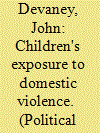

|
|
|
|
|
| Publication |
2009.
|
| Summary/Abstract |
The issue of domestic violence has gained greater recognition within public policy in the United Kingdom over the past decade. There is a recognition that up to one million children may have been exposed to violence between the adults with whom they live. This has consequences for the child in both the short and long term in terms of social and emotional adjustment. However, most male perpetrators of domestic violence are never held to account through the criminal justice system and therefore the child protection system is the safety net for these children. This though can result in a response that is premised on women's responsibility to protect their child from experiencing harm, typically by either leaving or forcing her partner to leave. Child welfare professionals do not engage with the men who are the source of the problem, rather women are held accountable for allowing their children and themselves to be in this situation. In this article this issue is discussed and proposals offered to improve this situation through empowering women, holding men to account for their behaviour whilst also recognising their position as fathers.
|
|
|
|
|
|
|
|
|
|
|
|
|
|
|
|
| 2 |
ID:
073755


|
|
|
|
|
| Publication |
2006.
|
| Summary/Abstract |
Much of the appeal of deliberative democracy lies in its emancipatory promise to give otherwise disadvantaged groups a voice, and to grant them influence through reasoned argument. However, the precise mechanisms for delivery of this promise remain obscure. After reviewing Habermas's formulation of deliberation, the article draws on recent theories of argumentation to provide a more detailed account of such mechanisms. The article identifies the key emancipatory mechanism as explicitness in language. It outlines the primary modalities of this mechanism: expressing differences of opinion, mobilising a shared standard of inference, and recognising and excluding fallacious appeals to irrelevant factors such as force or authority. It describes how these modalities are enhanced at a secondary, reflexive level that recognises the partiality and defeasibility of particular argumentative exchanges. Such qualifications, it is argued, support a model of deliberation across discourses that allows a clearer appreciation of its potential and limits.
|
|
|
|
|
|
|
|
|
|
|
|
|
|
|
|
| 3 |
ID:
126680
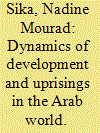

|
|
|
|
|
| Publication |
2013.
|
| Summary/Abstract |
This essay examines the structural economic reform measures undertaken in the Arab world in the past two decades. Developmental projects in the region have attained growth in gross domestic product, higher levels of human capital, and stable governments. These, however, have been accompanied by corruption, structural economic problems, social exclusion, and negligence of good governance and the rule of law. This essay suggests that the juxtaposition of economic reform and liberalization with corruption, authoritarianism, and absence of good governance were a recipe for the social tumult that became the Arab Spring. Social unrest will remain the rule rather than the exception in the Arab region for the foreseeable future, especially in countries that have undergone regime change, such as Egypt and Tunisia, due to the lack of expected economic and political reforms.
|
|
|
|
|
|
|
|
|
|
|
|
|
|
|
|
| 4 |
ID:
171135
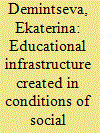

|
|
|
|
|
| Summary/Abstract |
This article demonstrates how social exclusion affects the strategies that migrants and their children experience vis-à-vis the preschool education system of the host society. We use the example of two private institutions established in Moscow by Kyrgyz migrants to explore their role in helping integrate migrant children into the host society. I examine the role the Kyrgyz community plays in the life of labour migrants in Moscow, and why private migrant infrastructure is created today by people from this particular country, though eventually migrants from other countries use it as well. I find that in recent years migrants have been creating private infrastructure in Russia as an alternative to the public one. It replaces state institutions for migrants that are not accessible to them. Migrants also view it as one of the channels for entering the Russian society and state institutions. These centres do not so much help migrants’ children escape social isolation as compensate for the lack of adjustment programmes in Russian schools.
|
|
|
|
|
|
|
|
|
|
|
|
|
|
|
|
| 5 |
ID:
134333
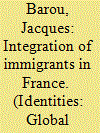

|
|
|
|
|
| Summary/Abstract |
This article seeks to identify the different factors that have facilitated or impeded the integration of immigrants in France from a historical perspective. Its aim is to shed light on the contemporary debates on the alleged failure of the republican integration model. First, we will show that – with the formation of the nation state – the integration of migrants was a constitutive element of the social cohesion of French society. Later, and during periods of xenophobia in particular, immigrants were classified according to their ability to assimilate into the French society. Since the 1970s, the double-barrelled integration question – concerning migrants and social cohesion – has reappeared. Within this context, the ‘colour-blind’ French republican model has been challenged, primarily from an economic perspective, not only by persistent social inequalities, but also, in its quintessence, by demands for cultural recognition. These factors have reinforced racial discrimination, the success of the populist extreme right and recurrent assimilation pressure.
|
|
|
|
|
|
|
|
|
|
|
|
|
|
|
|
| 6 |
ID:
132405
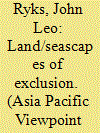

|
|
|
|
|
| Publication |
2014.
|
| Summary/Abstract |
This paper describes how the transformation of coastal New Zealand is directly connected to the dislocation and marginalisation of many M?ori coastal communities. It focuses on how this transformation is played out in text and talk and how certain types of boundaries function as important determinants in the construction and social order of coastal New Zealand. The high value and demand placed on specific, accessible 'cadastral' parcels of private coastal property dictates that much of New Zealand's coast is mapped according to constructs of wealth and desirability. In other parts of the country where development pressures on the coast are less prevalent, coastal communities are less evidently connected to markers of affluence and/or 'whiteness'. In these less disciplined spaces, uncertainty and liminality is more influential in the making of coastal places. Through an analysis of interviews with coastal planners and residents of coastal communities it is revealed that particular hegemonies, through the discourses they produce, attempt to assert a particular socio-spatial epistemology on counter-hegemonic groups in an effort to develop and manage the coast. Communities that revealed an alternative social ordering are described as messy and difficult to manage, while other coastal communities are marketed as exclusive, where model residents inhabit model places.
|
|
|
|
|
|
|
|
|
|
|
|
|
|
|
|
| 7 |
ID:
104033
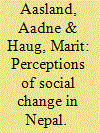

|
|
|
|
|
| Publication |
2011.
|
| Summary/Abstract |
Whereas it has been well documented that Nepal has experienced progress in economic and human development over the last decade, this article examines the impact of caste, ethnicity, religion and region on perceptions of socio-economic and socio-cultural change. Based on results of the Center for Nepal and Asian Studies (CNAS) Social Exclusion Survey of 2890 households, we find that regardless of background characteristics, a majority of people report socio-economic improvements, more ethnic integration and less discrimination. Although traditionally excluded caste, ethnic and religious groups are somewhat less likely to report social improvements than more privileged groups, two models of socio-economic and socio-cultural change show that such group differences disappear when controlling for socio-economic and other background characteristics.
|
|
|
|
|
|
|
|
|
|
|
|
|
|
|
|
| 8 |
ID:
131513
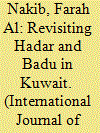

|
|
|
|
|
| Publication |
2014.
|
| Summary/Abstract |
Kuwait today is 99 percent urbanized. Though hosting a substantial desert population in the past, Kuwait no longer contains any Bedouin who practice a nomadic or pastoral lifestyle. And yet the term bad? remains in popular use in Kuwait to designate a group considered sociologically and culturally distinct from the ?a?ar, or settled urbanites, which in Kuwait's context refers solely to descendants of the pre-oil townspeople. This article explores why these social designations still exist in Kuwait and analyzes the origins of the conflictual relationship between the two groups. I argue that the persistence of the ?a?ar/bad? dichotomy is an outcome of state-building strategies adopted in the early oil years, mainly linked to citizenship and housing policies, that contributed to fixing ?a?ar and bad? as not only socially distinct but also geographically bounded groups. These state policies implemented between the 1950s and 1980s fostered the political integration but social exclusion of the bad?. The article examines the lived realities of these incoherent policies as one way of explaining how the bad? shifted from being the rulers' main loyalty base in the early oil decades to becoming their primary opposition today.
|
|
|
|
|
|
|
|
|
|
|
|
|
|
|
|
| 9 |
ID:
173259
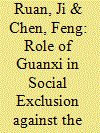

|
|
|
|
|
| Summary/Abstract |
This article is based on two case studies of social exclusion in two Chinese villages against the background of social stratification.Five types of social exclusion of the poor—housing, marriage, renqing, ritual, and gossip exclusion—are identified, which shrink the guanxi networks held by the poor. This in turn weakens their social and ritual capital and lowers their social status,leading to the reproduction of inequality. The research presented here finds that the vertical exclusiveness of guanxi, which is based on the concepts of in-group and out-group separation, superior and inferior separation, and symmetrical reciprocity, results in social exclusion of the poor. This process is underpinned by the instrumental use of the traditional Confucian ritual(li), in which ideas of modern social welfare, equality, and universalism are insufficient.
|
|
|
|
|
|
|
|
|
|
|
|
|
|
|
|
| 10 |
ID:
143316
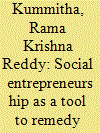

|
|
|
|
|
| Summary/Abstract |
Inspired by the practice of social enterprises, this article aims to understand how work integration social enterprises (WISE) function in relation to labour market integration of socially excluded persons in India. While mainly examining how socially excluded persons benefit from such interventions, questions are asked about what motivates social enterprises to get involved and to what extent they benefit themselves. Built on case study research in India, this article identifies a potential win–win situation, as members of excluded communities are empowered through the work integration approach, but social enterprises also benefit by building trust and achieving a sustainable orientation.
|
|
|
|
|
|
|
|
|
|
|
|
|
|
|
|
| 11 |
ID:
093727
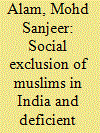

|
|
|
|
|
| Publication |
2010.
|
| Summary/Abstract |
Many nations today grapple with problems of social exclusion along ethno-religious lines and face demands for some kind of affirmative action by disadvantaged ethnic, racial and religious groups. In India, caste inequalities among Hindus have long been recognised and substantive measures for redressing disadvantages of lower castes have been in place for decades. Since India's Muslims, too, are faced with various types of social exclusion, there have been ongoing debates about the necessity of state intervention in the form of affirmative action for Muslims.
The article interrogates various strands of this debate. While relative socio-economic disadvantages among Muslims cannot be denied, how Muslims are currently presented as a marginalised and excluded community is shown to be too simplistic and actually leads to isolation. In view of the multi-dimensional nature of group disadvantage for Muslims, particularly spatial patterns observable across India, more careful understanding is needed to develop effective affirmative action policies. While deeply flawed reasoning grounds prevailing current arguments in favour of separate affirmative action for Muslims, the article suggests that the aim should be to achieve better development for all disadvantaged people from all communities in any particular space.
|
|
|
|
|
|
|
|
|
|
|
|
|
|
|
|
| 12 |
ID:
177981
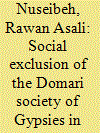

|
|
|
|
|
| Summary/Abstract |
This study looks into the lives of women from the Domari Society of Gypsies in Jerusalem. Residing in a conflict-ridden city and exposed to multiple stigmas, the study exposes the structures that perpetuate the disempowerment of Domari women in Jerusalem. It looks into their neighbourhoods, the social services available to them, the education services that they receive, their opportunities in the labour market, and the marriage patterns in the society. The study adopted qualitative research methods to allow the research participants to narrate their stories in ways meaningful to them. The narratives were analysed through an intersectional lens to expose the multiple oppressions these women are subject to. The women’s stories reveal high levels of stigma and isolation, which have disempowered members of the community and perpetuated the cycle of their exclusion.
|
|
|
|
|
|
|
|
|
|
|
|
|
|
|
|
| 13 |
ID:
100361
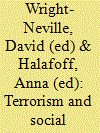

|
|
|
|
|
| Publication |
Cheltenham, Edward Elgar, 2010.
|
| Description |
ix, 204p.
|
| Standard Number |
9781847208163, hbk
|
|
|
|
|
|
|
|
|
|
|
|
Copies: C:1/I:0,R:0,Q:0
Circulation
| Accession# | Call# | Current Location | Status | Policy | Location |
| 055506 | 363.325/WRI 055506 | Main | On Shelf | General | |
|
|
|
|
| 14 |
ID:
171802
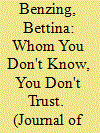

|
|
|
|
|
| Summary/Abstract |
Arguments about the importance of vernacular security focus on its positive and inclusive potential for peacebuilding. Reflecting on the special constitutional and sociopolitical challenges post-conflict societies face in the aftermath of conflict, though, this article focuses on the way perceptions of security and security in the vernacular can exacerbate exclusionary effects in post-conflict societies. I discuss current approaches to security concepts dealing with social perceptions of (in)security and the linkages made in research between vernacular security and local peace. But I also highlight exclusionary structures in post-conflict settings, which are most often marked by distrustful social relations, as a byproduct of security measures. I argue, in contrast to current assumptions in research on security in the vernacular, that everyday measures not only have positive implications for peacebuilding but can also lead to social exclusion, fostering violence and hindering social equality, development, and peace.
|
|
|
|
|
|
|
|
|
|
|
|
|
|
|
|
| 15 |
ID:
123378
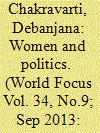

|
|
|
|
|
| Publication |
2013.
|
| Summary/Abstract |
India, today is acclaimed as one of the largest democracies in the world and for any democracy the two watchwords are the concepts of liberty and equality , the ideals learnt from the French Revolution. These two ideals are also considered as yardsticks for determining the successful functioning of any democracy. In our country we find a strange existence of so called constitutional guarantee of these lofty ideals as also the marginalization of communities and groups. The concept of marginalization refers to a policy of social exclusion.
|
|
|
|
|
|
|
|
|
|
|
|
|
|
|
|
|
|
|
|
|